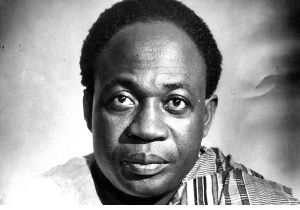Today marks the 110th birthday of foremost Pan-Africanist and first president of Ghana Osagyefo Dr. Kwame Nkrumah.
Born to Kofi Ngonloma of the Asona Clan and Elizabeth Nyanibah of the Anona Clan at Nkroful in the Western Region of what was then known as the Gold Coast, Nkrumah led the West African nation to gain its independence from Britain in 1957. This feat made it the first country on the continent to gain its independence.
A staunch advocate for a united African state and the total liberation of the African continent from imperialism and western dependency, Nkrumah was also one of the founding fathers of the Organization of African Unity (OAU), now African Union (AU).
Nkrumah was toppled from power in a coup on February 24, 1966, by the military with western backing while on a state visit to China and North Vietnam.
He is reported to have died of prostate cancer with no family member by his side after months of failing health following the mysterious death of his cook in Conakry, Guinea, where he was exiled.
Though much has been written about Nkrumah – from his private to his public life, certain facts about him that are hardly or not even known, including the details he provided when he was applying to undertake a PhD in Anthropology at the London School of Economics in 1945 makes for a very interesting case.
As Ghana, then known as Gold Coast hadn’t yet attained independence, Nkrumah filled his nationality on the form as “British Subject.”
Scroll through to read other interesting details he provided on the form as well as other things you may not have known about him:
Date of birth
Though Nkrumah’s date of birth has always been a topic of discussion, September 21, 1909, is the date that is officially accepted. On the LSE application form, however, he wrote his date of birth as September 12, 1912, before changing it to September 21, 1912.
Date of birth
Though Nkrumah’s date of birth has always been a topic of discussion, September 21, 1909, is the date that is officially accepted. On the LSE application form, however, he wrote his date of birth as September 12, 1912, before changing it to September 21, 1912.
Real name
Born Francis Nwia Kofi Ngonloma, he changed his name to Kwame Nkrumah in 1945 in the U.K., preferring Kwame since he was born on a Saturday. On the LSE form, however, the names he provided were Francis Nwia-Kofi Nkrumah.
Take a look at the form he personally filled below:

Assassination attempts Throughout Nkrumah’s presidency, he had close encounters with deaths for at least seven times. When he was not being shot at, he was being bombed. He was bombed at home, in his office, and while addressing political rallies.
Though he escaped them all, scores were injured as a result and others were killed.
Relationship with Guinea
Guinea, the country that made Nkrumah a Co-president for his immense support after French political and financial abandonment in 1958, held Nkrumah dearly after his overthrow and during his ill health.
His first son, Dr. Francis Nkrumah, who is now a professor, visited his ailing father in Guinea intermittently from Ghana where he lectured at the University of Ghana.
General News of Saturday, 21 September 2019
Source: face2faceafrica.com













